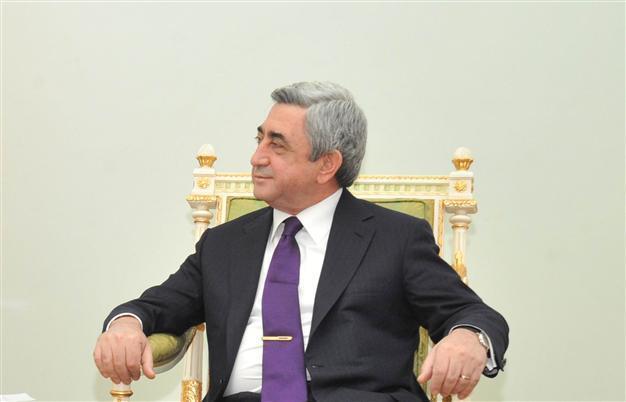Armenia parliament vote tests fragile democracy
YEREVAN - Agence France-Presse

Armenian president Serzh Sarkisian. AFP Photo
Armenians voted for a new parliament today in the biggest test of the ex-Soviet state's fragile democratic credentials since disputed presidential elections in 2008 ended in fatal clashes.
The authorities promised an unprecedentedly clean contest for the 131-seat National Assembly in the hope of avoiding further turmoil after battles between riot police and opposition supporters four years ago left 10 people dead.
"I am for change but without drastic upheavals. We need stability," one voter at a polling station in the capital Yerevan, electrician Garnik Khacheian, told AFP.
"I voted for fairness. It's impossible to live in a country where human rights are not observed, where there is no work and there are the very rich and those who have nothing," said unemployed voter Alvard, who declined to give her surname.
Opinion polls suggested that President Serzh Sarkisian's governing Republican party was ahead of its ally in the outgoing parliamentary coalition -- the Prosperous
Armenia party, led by millionaire tycoon and former arm-wrestling champion Gagik Tsarukian -- with opposition parties trailing.
"We expect highly active participation," Armen Khazarian, an official at one polling station in Yerevan, told AFP.
The Armenian National Congress opposition bloc led by former president Levon Ter-Petrosian has alleged that the governing party is planning to rig the
vote to keep power and has threatened protests.
A pre-poll report by observers from the Organisation for Security and Cooperation in Europe (OSCE) did not register systematic violations, although media reports alleged that some parties have been bribing potential voters.
The final day of campaigning on Friday was marred when around 150 people were injured amid chaotic scenes as scores of gas-filled balloons exploded at a Republican party rally in Yerevan, sparking criticism of Sarkisian for continuing the event after the incident.
Campaigning in the Caucasus state of 3.3 million people mainly focused on issues of unemployment, poverty and emigration rather than Armenia's long-running political disputes with neighbours Turkey and Azerbaijan.
Landlocked and impoverished Armenia has suffered economically because its borders with both countries are closed.
No final peace deal has been signed with Azerbaijan since the 1990s war over the region of Nagorny Karabakh, and gun battles often erupt along the front line.
Around 2.5 million people are eligible to vote in the elections, which are being contested by eight parties and one bloc.
Some 350 European observers and 31,000 local monitors are scrutinising the conduct of the polls, which close at 8:00 pm local time
